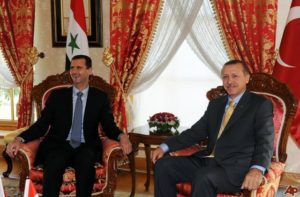Increasing ties between Syria and Turkey have been making headlines for sometime now, so that means it’s time to discuss the issue here.

Turkish PM Erdogan and Syrian President Assad meet to discuss regional issues
The process of rehabilitating relations has been ongoing for over a decade now, and over the past year the pace of rapprochement has quickened significantly. This powerful new friendship is multifaceted, with ties being fostered in the economic, diplomatic, and security arenas especially.
The first step in rebuilding this often troubled relationship came at it’s lowest point, when former President Hafez al-Assad handed over PKK (Kurdistan Workers Party) leader Abdullah Ocalan under intense Turkish military pressure. Up to that point the Turkish-Syrian dynamic had been defined by border disputes, contentious water usage, mutual political subversion, and constant diplomatic tension. However, relations have steadily improved since Ocalan reached Turkish custody.
The next major step came in 2004, as the two nations signed a landmark free-trade agreement that resolved the long standing dispute over Hatay province (referred to as Iskenderun by Syria prior to ceding all territorial claims) as well as establishing firm trade links and partnerships. These links are starting to bear fruit as, according to a recent NY Times article, trade between the two nations reached $1.6 billion in 2009.
Diplomatic relations have followed a similar trajectory as those in the economic spectrum. This was made clear when the two agreed to eliminate visa restrictions on cross border travel in September, 2009. Another declaration of the new found diplomatic proximity has come in the aftermath of the Gaza flotilla raid by Israel. Syria has depended on Turkey as a mediator in it’s ongoing attempts to regain the Golan Heights. Syria has become so dependent on Turkey that President al-Assad focused the majority of his remarks to the Turkish press on how a conflict between Turkey and Israel, over the flotilla raid, could weaken Turkey’s ability to mediate regional disputes. He called Turkey “Syria’s greatest hope”.
The most notable indication of growing Syrian-Turkish cooperation has been in the security domain. Late last month Syrian security personnel detained 400 people with suspected ties to the PKK. This is were things get really interesting. While trade agreements and diplomatic glad handing are one thing, arresting 400 people on behalf of a foreign government is another. This represents a MAJOR step.
How should the world be reading all these tea leaves?
From one point of view it would seem a major positive to have a NATO member, and aspiring EU member, attempting to moderate the behavior of a neighbor attempting to rehabilitate it’s image internationally. However, due to recent questions regarding Turkey’s intentions after a perceived shift away from the west, a certain amount of skepticism would not be unwarranted.
I am inclined to see the growing ties between the two nations as a positive, especially from the Syrian perspective. Desperate for economic development, Turkey represents Syria’s best opportunity for growth. Syria is also actively trying to build international relationships as it urgently wants to avoid the isolation it endured under the Bush administration. If it can foster a deep and lasting friendship just across the border this can only advance Syrian interests. The world should see this as a chance to allow the Syrian regime to moderate. That moderation is much more likely to happen, much less endure, if it comes with the carrot of Turkish trade as a sweetener than it as a part of US sanctions and isolation.